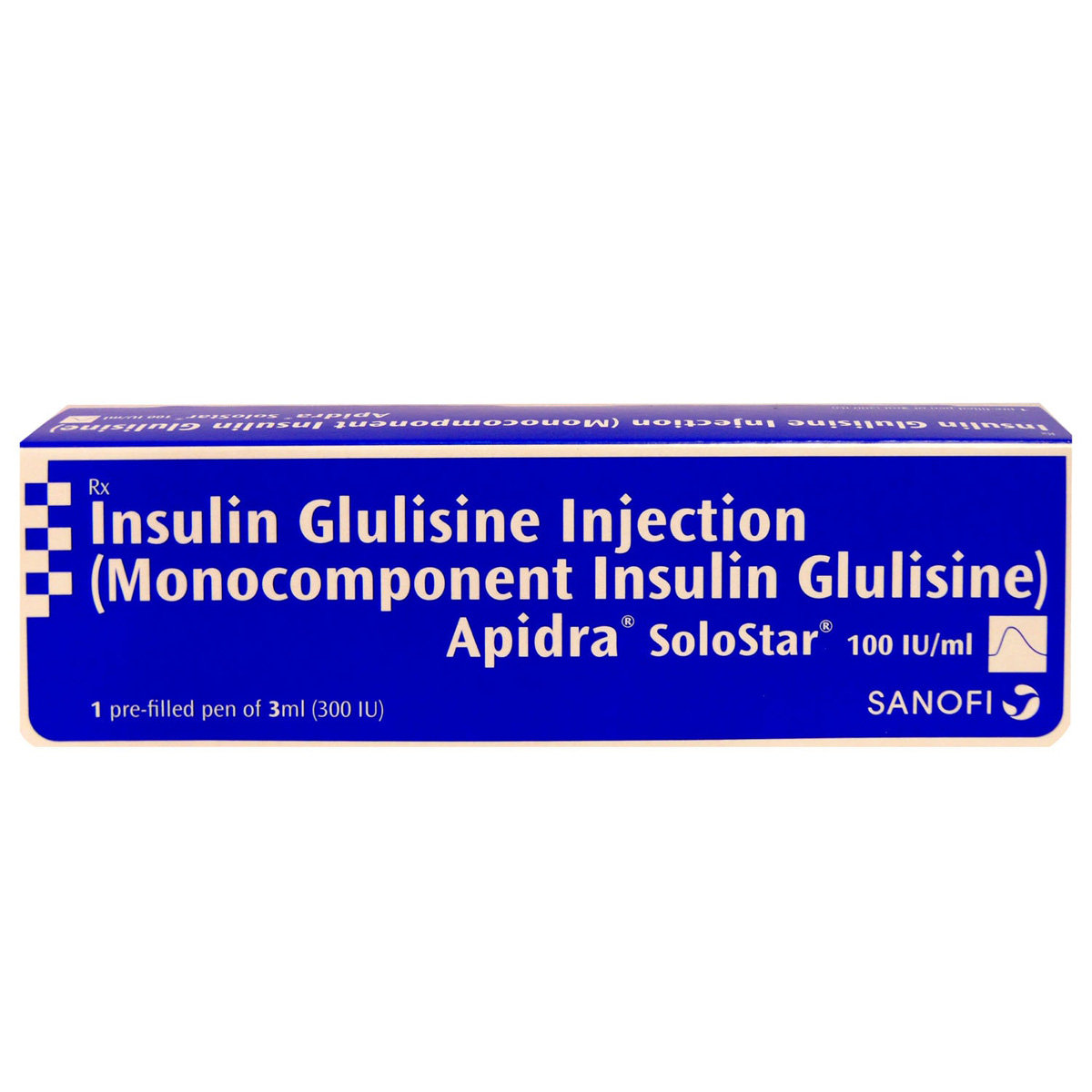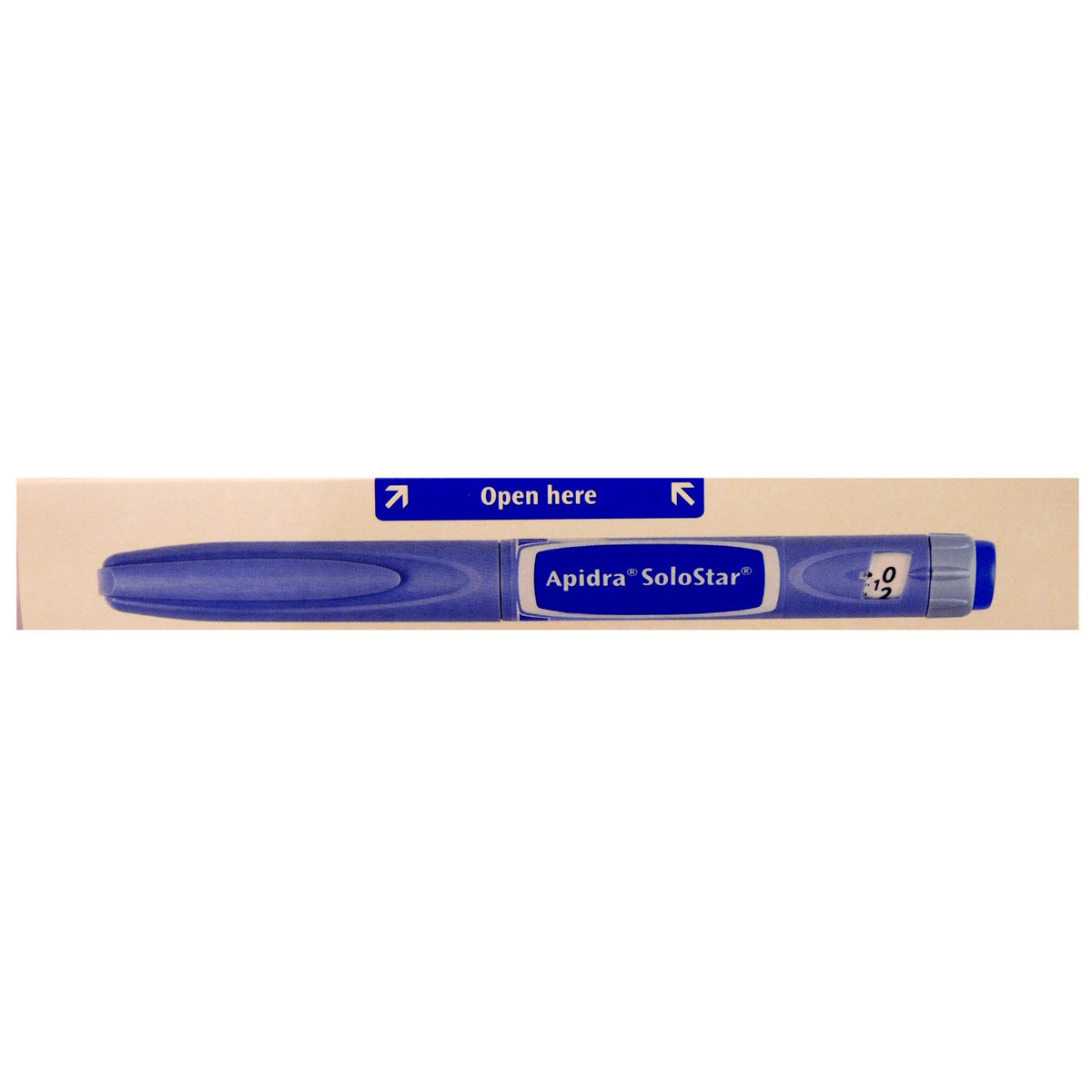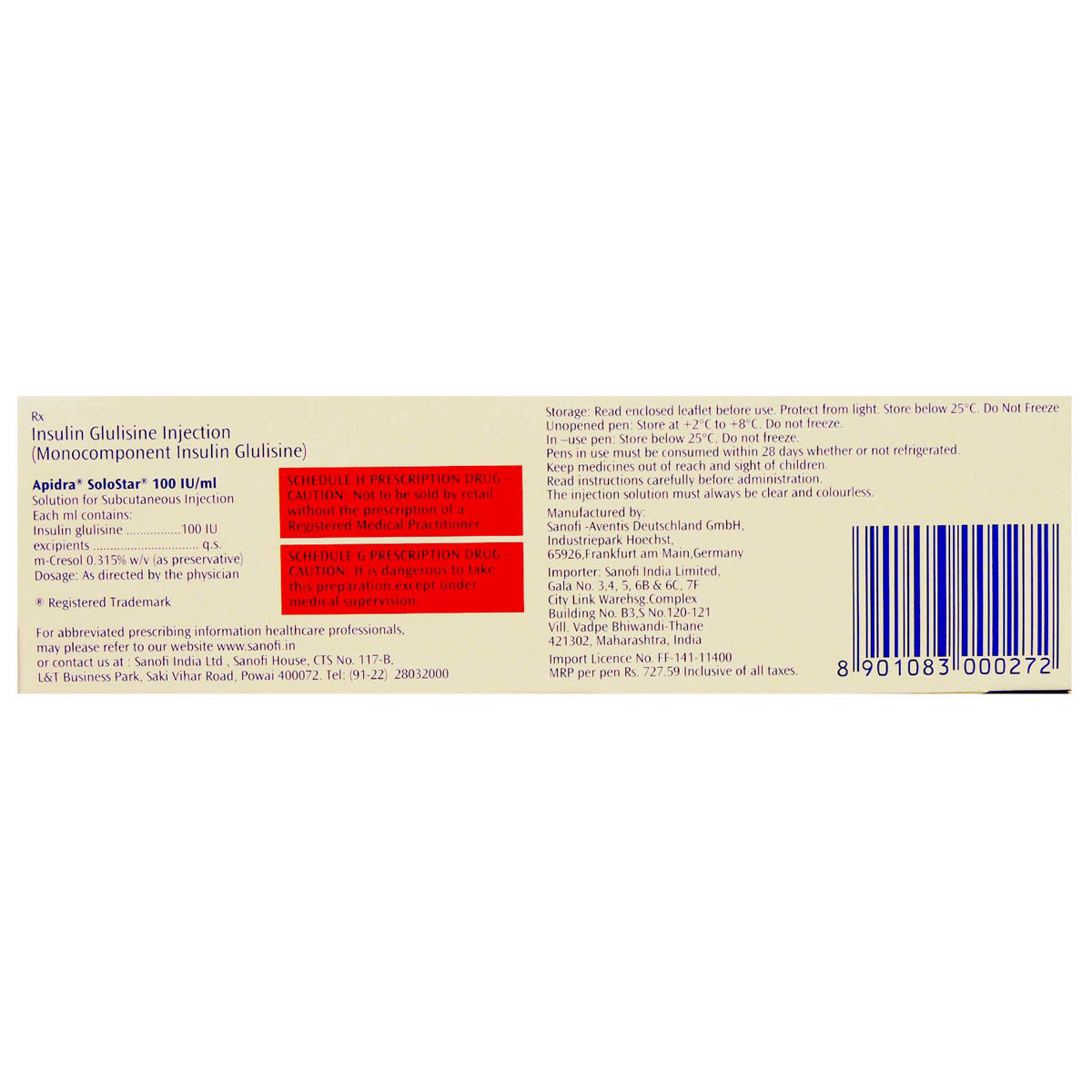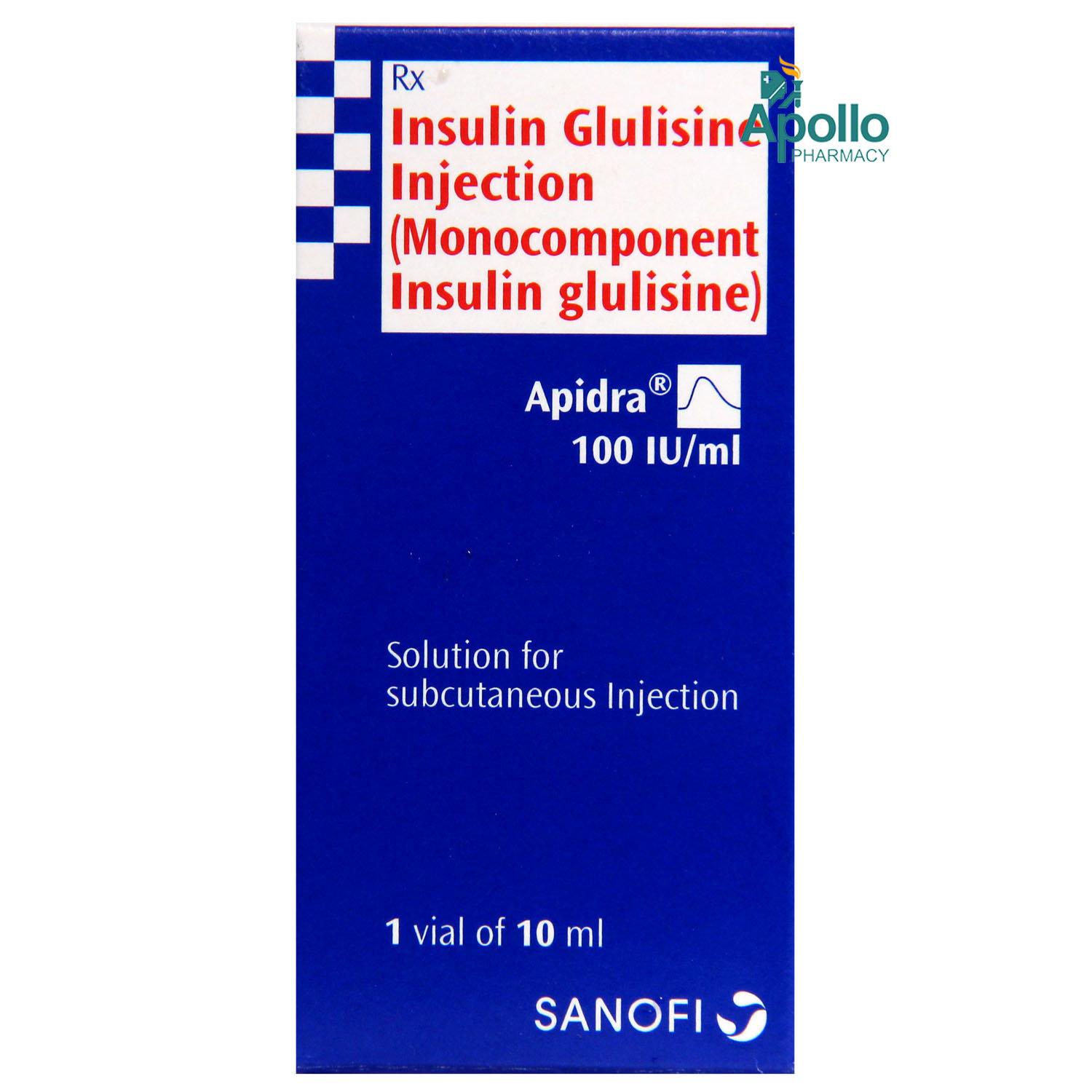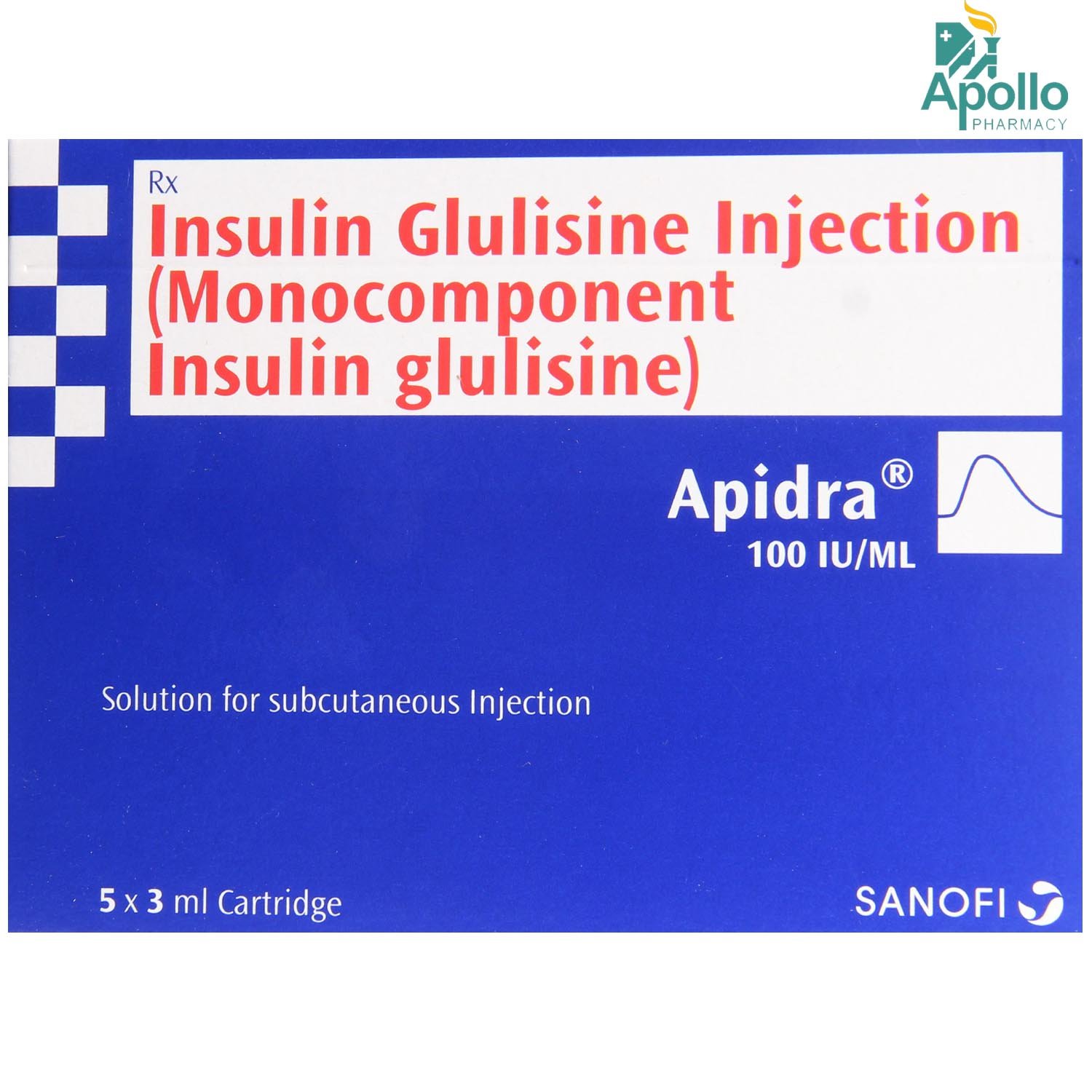Apidra Solostar 100IU/ml Injection 3 ml
MRP ₹1064
(Inclusive of all Taxes)
₹159.6 Cashback (15%)
Provide Delivery Location
Online payment accepted
 Prescription drug
Prescription drugWhats That
Composition :
Manufacturer/Marketer :
Consume Type :
Expires on or after :
Return Policy :
About Apidra Solostar 100IU/ml Injection 3 ml
Apidra Solostar 100IU/ml Injection 3 ml is rapid-acting insulin for the treatment of diabetes mellitus in both children (above six years of age) and adults. The active ingredient in Apidra Solostar 100IU/ml Injection 3 ml is insulin glulisine. Apidra Solostar 100IU/ml Injection 3 ml is a recombinant human insulin analogue that is equipotent to regular human insulin. Insulin glulisine has a more rapid onset of action and a shorter duration of action than regular human insulin. Diabetes is a lifelong condition that causes a person's blood sugar level to become too high.
Apidra Solostar 100IU/ml Injection 3 ml is a fast-acting insulin that works rapidly to normalise blood sugar levels after a meal. It typically begins working within 10-20 minutes after injection, peaks in about 1 hour, and keeps working for 2 to 4 hours. Due to this short action, Apidra Solostar 100IU/ml Injection 3 ml should normally be taken in combination with intermediate-acting or long-acting insulin preparations. Apidra Solostar 100IU/ml Injection 3 ml works by ensuring rapid and consistent sugar control. Apidra Solostar 100IU/ml Injection 3 ml is a fast-acting form of insulin that helps lower blood sugar levels after food intake. Prevents the risk of having severe complications of diabetes.
The primary role of insulin and insulin analogues, including insulin glulisine, is glucose metabolism control. Insulin lowers blood glucose levels by stimulating peripheral glucose uptake, particularly skeletal muscle and fat, and inhibiting hepatic glucose production. Insulin glulisine takes effect about twice as fast as regular human insulin and completes the glucose-lowering effect about 2 hours earlier than regular human insulin.
Your doctor will advise you on how to use Apidra Solostar 100IU/ml Injection 3 ml. It should be administered at least 0-15 minutes before or soon after meals. The common side effects of Apidra Solostar 100IU/ml Injection 3 ml are hypokalaemia (low potassium), hypoglycaemia (low blood sugar level), local injection site reactions, lipodystrophy (fat deposition under the skin), rash, and pruritus (itch skin), which may occur at the injection site. Most of these side effects of Apidra Solostar 100IU/ml Injection 3 ml do not require medical attention and gradually resolve over time. However, if the side effects are persistent, reach out to your doctor.
Try not to stop taking Apidra Solostar 100IU/ml Injection 3 ml of your own. Let your doctor know about this, as it may cause withdrawal symptoms. Do not take Apidra Solostar 100IU/ml Injection 3 ml if you have any low blood glucose levels, kidney, liver, or heart problems, or problems with alcohol or other prescription recreational drugs. Along with Apidra Solostar 100IU/ml Injection 3 ml, you should take a healthy diet, exercise regularly, and maintain weight as your doctor advises. Apidra Solostar 100IU/ml Injection 3 ml is a cold chain medicine, so it must be stored in the refrigerator between 2-8 degrees Celsius; otherwise, its efficiency might get lost. Do not store it in the freezer of the fridge.
Uses of Apidra Solostar 100IU/ml Injection 3 ml
Directions for Use
Key Benefits
The primary role of insulin and insulin analogues, including insulin glulisine, is glucose metabolism control. Insulin lowers blood glucose levels by stimulating peripheral glucose uptake, particularly skeletal muscle and fat, and inhibiting hepatic glucose production. Apidra Solostar 100IU/ml Injection 3 ml works by ensuring rapid and consistent sugar control. Apidra Solostar 100IU/ml Injection 3 ml is a fast-acting form of insulin that helps lower blood sugar levels after food intake. Prevents the risk of having severe complications of diabetes. It stimulates the recovery of sugar in muscle and fat cells and thus suppresses sugar production in the liver. Apidra Solostar 100IU/ml Injection 3 ml helps in improving the glycaemic control, which in turn decreases the risk of progression of complications of diabetes like damage of the retina (retinopathy), damage of kidney (nephropathy), damage of nerve cells (neuropathy), delayed wound healing, diabetic foot ulcer and others. Besides this, Apidra Solostar 100IU/ml Injection 3 ml can be safely prescribed to the diabetic mother during pregnancy and lactation.
Storage
Drug Warnings
Apidra Solostar 100IU/ml Injection 3 ml is for subcutaneous (under the skin) in the abdominal wall, thigh, or upper arm. It can also be administered intravenously (IV) only with 0.9% saline solution infusion. If you are changing the brand of insulin or if you need to inject your insulin by another method, it should be done under strict medical supervision. Cases of heart failure were reported when pioglitazone was used with insulin, especially in patients at high risk of cardiac heart failure. The first symptoms of hyperglycaemia (high blood sugar level) may include symptoms like excessive thirst, dry mouth, increased frequency of urination, nausea, vomiting, drowsiness, flushed dry skin, loss of appetite and acetone odour of the breath. You should closely monitor these symptoms. If you have had any heart attack or have weight gain and oedema (fluid deposition in tissue), let your doctor know before taking Apidra Solostar 100IU/ml Injection 3 ml. It is advisable not to consume alcohol as it may either increase or decrease your blood glucose level. Care should be taken while travelling across more than two time zones. Your doctor may adjust your insulin schedule. Apidra Solostar 100IU/ml Injection 3 ml may decrease the level of potassium (hypokalemia) if left untreated, may lead to respiratory paralysis, irregular heartbeat rhythm, coma and even death. Do not take Apidra Solostar 100IU/ml Injection 3 ml if you have any low blood glucose levels, kidney, liver, or heart problems, or problems with alcohol or other prescription recreational drugs.
Drug-Drug Interactions
Drug-Drug Interactions
Login/Sign Up
Taking Apidra Solostar 100IU/ml Injection 3 ml with Moxifloxacin affects blood glucose levels, which may cause hyperglycemia (high blood sugar) and hypoglycemia (low blood sugar) less frequently.
How to manage the interaction:
Although taking Moxifloxacin and Apidra Solostar 100IU/ml Injection 3 ml together can result in an interaction, it can be taken if a doctor has prescribed it. However, consult the doctor immediately if you experience headache, dizziness, and rapid heartbeat, increased thirst, and increased urination. Do not stop using any medications without talking to a doctor.
Taking Apidra Solostar 100IU/ml Injection 3 ml with ciprofloxacin can effect blood sugar levels, both hyperglycemia (high blood sugar) and, less frequently, hypoglycemia (low blood sugar).
How to manage the interaction:
Although taking ciprofloxacin and Apidra Solostar 100IU/ml Injection 3 ml together can possibly result in an interaction, it can be taken if your doctor has prescribed it. However, consult a doctor if you experience hypoglycemia, hyperglycemia, or a decline in blood glucose control. Hypoglycemia can cause headaches, dizziness, sleepiness, anxiety, confusion, shaking, nausea, hunger, weakness, sweating, palpitations, and a rapid heartbeat. Increased hunger, thirst, and urine are all possible signs of hyperglycemia. It is recommended to maintain blood glucose levels.
Co-administration of Ofloxacin and Apidra Solostar 100IU/ml Injection 3 ml can sometimes have an effect on blood glucose levels.
How to manage the interaction:
Although combining Ofloxacin and Apidra Solostar 100IU/ml Injection 3 ml can lead to an interaction, they can be taken on a doctor's advice. If you experience any symptoms of hypoglycemia (headache, dizziness, sleepiness, nervousness, confusion, shaking, nausea, loss of hunger, weakness, sweating, palpitation, and rapid heartbeat) or hyperglycemia (increased thirst, hunger, and urination), consult a doctor. Keep an eye on your blood glucose levels. Do not discontinue any medications without consulting a doctor.
Taking Apidra Solostar 100IU/ml Injection 3 ml with nalidixic acid affects blood glucose levels, which may cause hyperglycemia (high blood sugar) and hypoglycemia (low blood sugar) less frequently.
How to manage the interaction:
Although taking nalidixic acid and Apidra Solostar 100IU/ml Injection 3 ml together can possibly result in an interaction, it can be taken if your doctor has prescribed it. However, consult the doctor immediately if you experience hypoglycemia or hyperglycemia. Symptoms of hypoglycemia include headache, dizziness, drowsiness, nervousness, confusion, shaking, nausea, loss of hunger, weakness, sweating, palpitation, and rapid heartbeat. Symptoms of hyperglycemia may include increased thirst, increased hunger, and increased urination. Do not stop using any medications without first talking to your doctor.
Taking Apidra Solostar 100IU/ml Injection 3 ml with gatifloxacin affects blood glucose levels, which may cause hyperglycemia (high blood sugar) and hypoglycemia (low blood sugar) less frequently.
How to manage the interaction:
Although taking Gatifloxacin and Apidra Solostar 100IU/ml Injection 3 ml together can possibly result in an interaction, it can be taken if your doctor has prescribed it. However, consult the doctor immediately if you experience hypoglycemia or hyperglycemia. Symptoms of hypoglycemia include headache, dizziness, drowsiness, nervousness, confusion, shaking, nausea, hunger, weakness, sweating, palpitation, and rapid heartbeat. Symptoms of hyperglycemia may include increased thirst, increased hunger, and increased urination. Do not stop using any medications without first talking to your doctor.
Taking Apidra Solostar 100IU/ml Injection 3 ml with sparfloxacin affects blood glucose levels, which may cause hyperglycemia (high blood sugar) and hypoglycemia (low blood sugar) less frequently.
How to manage the interaction:
Although taking Sparfloxacin and Apidra Solostar 100IU/ml Injection 3 ml together can possibly result in an interaction, it can be taken if your doctor has prescribed it. However, consult the doctor immediately if you experience hypoglycemia or hyperglycemia. Symptoms of hypoglycemia include headache, dizziness, drowsiness, nervousness, confusion, shaking, nausea, hunger, weakness, sweating, palpitations, and rapid heartbeat. Symptoms of hyperglycemia may include increased thirst, increased hunger, and increased urination. Do not stop using any medications without first talking to your doctor.
Taking Apidra Solostar 100IU/ml Injection 3 ml with cinoxacin affects blood glucose levels, which may cause hyperglycemia (high blood sugar) and hypoglycemia (low blood sugar) less frequently.
How to manage the interaction:
Although taking cinoxacin and Apidra Solostar 100IU/ml Injection 3 ml together can possibly result in an interaction, it can be taken if your doctor has prescribed it. However, consult the doctor immediately if you experience hypoglycemia or hyperglycemia. Symptoms of hypoglycemia include headache, dizziness, drowsiness, nervousness, confusion, shaking, nausea, hunger, weakness, sweating, palpitation, and rapid heartbeat. Symptoms of hyperglycemia may include increased thirst, increased hunger, and increased urination. Do not stop using any medications without first talking to your doctor.
Taking Apidra Solostar 100IU/ml Injection 3 ml with Trovafloxacin affects blood glucose levels, which may cause hyperglycemia (high blood sugar) and hypoglycemia (low blood sugar) less frequently.
How to manage the interaction:
Although taking Trovafloxacin and Apidra Solostar 100IU/ml Injection 3 ml together can possibly result in an interaction, it can be taken if your doctor has prescribed it. However, consult the doctor immediately if you experience hypoglycemia or hyperglycemia. Symptoms of hypoglycemia include headache, dizziness, drowsiness, nervousness, confusion, shaking, nausea, loss of hunger, weakness, sweating, palpitation, and rapid heartbeat. Symptoms of hyperglycemia may include increased thirst, increased hunger, and increased urination. Do not stop using any medications without first talking to your doctor.
Blood glucose levels can be affected by levofloxacin when taken with Apidra Solostar 100IU/ml Injection 3 ml. It may cause hyperglycemia (high blood glucose) and, less commonly, hypoglycemia (low blood glucose).
How to manage the interaction:
There could be a possible interaction between Apidra Solostar 100IU/ml Injection 3 ml and Levofloxacin but can be taken if prescribed by a doctor. However, consult the doctor immediately if you experience symptoms of hypoglycemia, which include headache, dizziness, drowsiness, nervousness, confusion, tremor, nausea, hunger, weakness, perspiration, palpitation, and rapid heartbeat, or symptoms of hyperglycemia which may include increased thirst, increased hunger, and increased urination. Do not stop using any medications without talking to a doctor.
Taking Apidra Solostar 100IU/ml Injection 3 ml with grepafloxacin affects blood glucose levels, which may cause hyperglycemia (high blood sugar) and hypoglycemia (low blood sugar) less frequently.
How to manage the interaction:
Although taking Grepafloxacin and Apidra Solostar 100IU/ml Injection 3 ml together can possibly result in an interaction, it can be taken if your doctor has prescribed it. However, consult the doctor immediately if you experience hypoglycemia or hyperglycemia. Symptoms of hypoglycemia include headache, dizziness, drowsiness, nervousness, confusion, shaking, nausea, hunger, weakness, sweating, palpitation, and rapid heartbeat. Symptoms of hyperglycemia may include increased thirst, increased hunger, and increased urination. Do not stop using any medications without talking to a doctor.
Drug-Food Interactions
Drug-Food Interactions
Login/Sign Up
Diet & Lifestyle Advise
- Exercise may lower your body’s need for insulin during and sometimes after physical activity.
- Exercise may also speed up the effect of an insulin dose, especially if the exercise involves the area of the injection site (for example, the leg should not be used for injection just prior to running).
- Discuss with your doctor how to adjust your insulin regimen to accommodate exercise.
- Avoid eating sugar food and prefer food cooked food low in calories.
- When travelling across more than two time zones, you should talk to your doctor concerning adjustments in your insulin schedule.
Side Effects of Apidra Solostar 100IU/ml Injection 3 ml
- Injection site reactions (such as reddening, unusually intense pain on injection, itching, hives, swelling or inflammation)
- Hypoglycaemia (low blood sugar level)
- Hypokalaemia (low potassium)
- Lipodystrophy (fat deposition under the skin)
- Rash
- Pruritus (itchy skin)
Habit Forming
Therapeutic Class
All Substitutes & Brand Comparisons
RX
Apidra 100IU / ml Injection 10 ml
Sanofi India Ltd
₹1687
(₹168.7/ 1ml)
52% CHEAPERRX
Apidra 100IU Cartridge 3 ml
Sanofi India Ltd
₹837
(₹279.0/ 1ml)
21% CHEAPER
Author Details
We provide you with authentic, trustworthy and relevant information
Drug-Diseases Interactions
Drug-Diseases Interactions
Login/Sign Up
FAQs
Apidra Solostar 100IU/ml Injection 3 ml can be given to treat both the condition of type 1 and type 2 diabetes mellitus. However, your doctor will decide whether Apidra Solostar 100IU/ml Injection 3 ml can be given to you or not depending on your present condition. Apidra Solostar 100IU/ml Injection 3 ml should be avoided in patients who are allergic to Apidra Solostar 100IU/ml Injection 3 ml or other forms of insulin, patients with kidney disease, liver disease, low blood sugar/glucose level (hypoglycaemia), and low potassium level (hypokalaemia).
Insulin kept out of the refrigerator will not poison you or even make you sick. It just means that your insulin will not work as well or deliver its full potential dose. In simple terms, if your blood sugar is high, and you use the insulin that has been kept out, your blood sugar may not be lowered.
Insulin is released from the beta cells in your pancreas in response to the rise in glucose in your bloodstream. After you have consumed a meal, any carbohydrate you have eaten is broken down into glucose and transferred into the bloodstream. The pancreas detects this rise in blood glucose and starts to secrete insulin.
Habitual moderate coffee drinking has actually been associated with increased insulin sensitivity and lowered risk for type 2 diabetes. But in acute and high doses, caffeine can decrease insulin sensitivity and raise plasma insulin levels.
Insulin is released from the beta cells present in your pancreas in response to rising glucose in your bloodstream. The pancreas detects this rise in blood glucose and starts to secrete insulin.
A hard-boiled egg is a handy high-protein snack when you have diabetes. Your protein will help keep you full without impacting your blood sugar. Protein not only slows down digestion, but it also slows down the absorption of glucose. If you have diabetes, this is very beneficial.
Pramlintide, Ethanol (Alcohol) and Macimorelin have got serious interactions with Apidra Solostar 100IU/ml Injection 3 ml. So, do not take these medicines with Apidra Solostar 100IU/ml Injection 3 ml.
Drug-Drug Interactions Checker List
- ASPIRIN
- FUROSEMIDE
- METOPROLOL
- BUDESONIDE+FORMOTEROL
Special Advise
- Your doctor may tell you to have a regular potassium level as prolonged administration causes a life-threatening condition of hypokalemia (low potassium).
Disease/Condition Glossary
Diabetes: Diabetes is a chronic or lifelong disease that prevents the body from utilizing insulin properly. Insulin is the hormone that controls sugar levels in the blood. Diabetes is a condition in which blood glucose levels are above normal. It is of two types, namely: type-1 and type-2 diabetes. Type-1 diabetes is a condition in which the pancreas produces little or no insulin. Type-2 diabetes affects the way the body processes sugar. Symptoms of diabetes include lack of energy, tiredness, frequent urination, excess thirst, dry mouth, blurry vision, constant hunger, weight loss, and itchy skin.

Have a query?
Alcohol
Safe if prescribed
You are recommended not to consume alcohol along with Apidra Solostar 100IU/ml Injection 3 ml to avoid unpleasant side-effects. Alcohol may either decrease or increase the blood sugar level which can be fatal.
Pregnancy
Consult your doctor
Apidra Solostar 100IU/ml Injection 3 ml can be used during pregnancy. Your insulin dose may need to be changed during pregnancy and after delivery.
Breast Feeding
Consult your doctor
Apidra Solostar 100IU/ml Injection 3 ml can be given safely to nursing mothers but only under the supervision of a physician.
Driving
Safe if prescribed
Drive with caution, Apidra Solostar 100IU/ml Injection 3 ml usually causes drowsiness and affects driving ability. Your ability to concentrate and react may be reduced if you have hypoglycaemia (low blood sugar).
Liver
Consult your doctor
Apidra Solostar 100IU/ml Injection 3 ml to be taken with caution, especially if you have a history of liver diseases/conditions. The dose may have to be adjusted by your doctor.
Kidney
Consult your doctor
Apidra Solostar 100IU/ml Injection 3 ml to be taken with caution, especially if you have a history of kidney diseases/conditions. The dose may have to be adjusted by your doctor.
Children
Safe if prescribed
Apidra Solostar 100IU/ml Injection 3 ml can be given safely to children provided; dose has to be prescribed by a child specialist.

